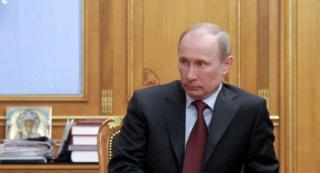
U.S. President Barack Obama should pledge to keep U.S.-Russia relations at the top of his busy agenda. Ending American neglect of its relations with Russia is what is needed to mend the countries’ bleak relations. A constructive foreign policy toward Russia can begin with negotiating and renewing the 1991 START treaty as well as creating a meaningful Euro-Atlantic alliance that includes Russia.

Due to the current economic crisis, Vladimir Putin is facing, for the first time since his rise to power, the prospect of real political instability. Although Putin has depended on a ‘vertical’ type of government, the logic of this crisis demands flexibility, effective feedback, and broad dialogue with the nation.

Weakened by the economic crisis, President Medvedev and the Kremlin do not want to risk any chance of allowing popular dissent to develop in Russia's regions. But by attacking its opponents the Kremlin is showing its helplessness. Before the crisis it had hoped to modernize the country, now it must resort to damage control.

Nearly 86,000 people have signed a letter asking President Medvedev to pardon Svetlana Bakhmina, a former lawyer for Yukos. Bakhmina, who is due to give birth within weeks, is in a prison camp. Yet Medvedev continues to ignore the call for mercy from thousands of Bakhmina's supporters and thus stands personally responsible for her suffering.

As John McCain formally accepts his nomination for president, Russian coverage of the event and the campaign in general has been distanced and sometimes condescending. Instead, the Russian media has mainly been focused on the events in Georgia.

Putin may have succeeded Boris Yeltsin, but he decided to adopt the leadership style of Yury Andropov. This style is reflected in Russia’s current dealings with Georgia, which represent a major foreign policy shift for the country. However, these actions will prove to be harmful for Russia and will reignite its own current ethnic separatist movements.

Although U.S.-Russia relations have deteriorated, options for cooperation still exist. Particularly in the area of nuclear nonproliferation, collaboration is essential and may be the best way to ameliorate relations. Russia, the U.S., and Europe should start with negotiating the Treaty on Conventional Armed Forces in Europe (CFE), which will provide a starting point for brokering a new consensus.

Unlike what has recently been alleged, the world is not experiencing a new Cold War. Today’s chill in U.S.-Russia relations rests on Russia’s belief that what is good for the West is inherently bad for Russia. Jumping headlong into a confrontation would be a bad idea though for the West. Instead, Western leaders should show that we can gain more from partnership.

The Russia-Georgia conflict is a watershed for a new era in geopolitics. As America scrambles to react to the crisis, Russia will continue to challenge Western influence in the former Soviet space. In turn, both will turn to Europe, and Europe’s ability to defend its own interests will be the most severe test yet for the Union. All the while, China, Iran and others watch with keen interest.

The search for a way for all parties in the Russia-Georgia conflict to sit down at the negotiating table is gradually beginning. There is real promise that an EU forum can establish an acceptable format and most likely, Russia is ready to make some concessions. Nevertheless, excessive pressure on Moscow will only strengthen its internal conservative forces and thus exacerbate its hard line stance.

Although in the short term the basis for a ceasefire has formed between Russia and Georgia, the conflict has entirely transformed the region. Russian peacekeepers can now no longer operate alone in the separatist regions. In addition, South Ossetia and Abkhazia cannot revert back to Georgia. Finally, the already deteriorating Russia-U.S. relationship will now face a new set of challenges.

A united Europe could play the pivotal peacemaker in the Russia-Georgia conflict, strengthening cooperation in the continent’s east. However, both unity and independent action on Europe’s part are unlikely. Therefore, the Russia policy of the next U.S. president will be essential for ensuring stability in the region.